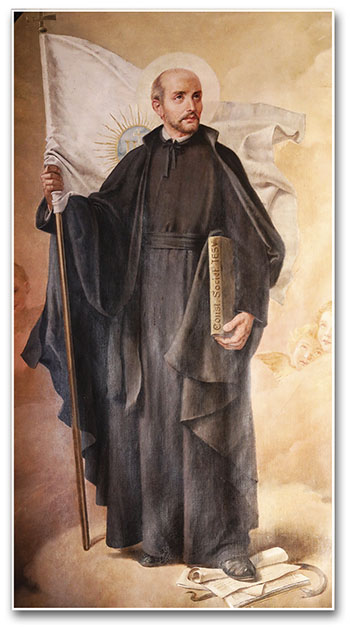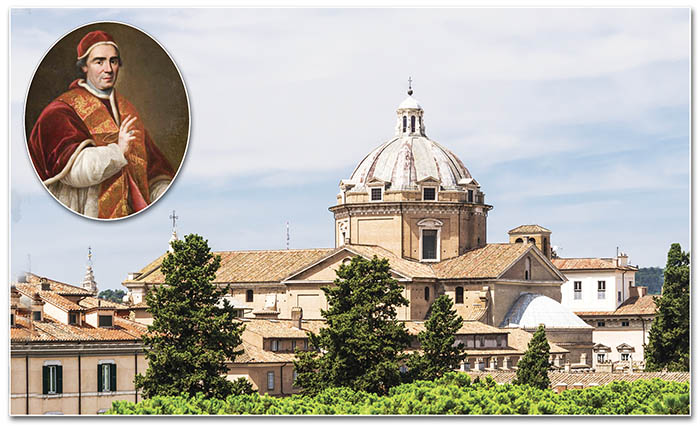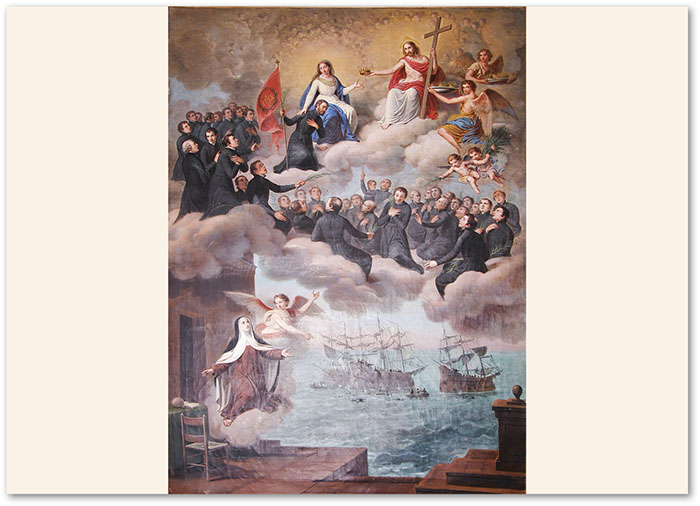A vessel facing a stormy sea, at risk of sinking at any moment and resisting the impact of the turbulent waves, can serve as an analogy to the career of some men and women who have marked the history of the Church and of nations by their heroic virtues.
Such souls underwent paroxysmal situations that were contradictory and humiliating in the world’s estimation, and left a remarkable example of resistance for future generations. They understood the language of the wise and followed the path pointed out by the Redeemer: obedience to the Father’s will!
Who were they?
Let us go back to the 16th century. Countless ships were then defying the oceans and sailing around the world to satisfy the aspirations of great sovereigns. At that time, in Spain, the Blessed Virgin won the heart of a man of fiery and chivalrous soul: Íñigo de Loyola!
After the famous conversion of the one who from then on would be called Ignatius, the illustrious warrior – noble in lineage, but above all in character – led by the breath of the Holy Spirit, gathered a few men to constitute a squadron in defense of Peter’s barque. They attracted attention wherever they went: in public squares, schools, universities, courts, pulpits and other ecclesiastical environments, they were the object of applause or censure. Ready to face any risk, they educated consciences “reformed” by the heresies of the time.
How to define them? As intrepid missionaries? Shrewd diplomats? Sympathetic counselors? Wise educators? Humble religious or pious priests? Who were they? “To those who ask us what we are, we shall reply that we are soldiers of the Holy Church, enlisted under the standard of Jesus Christ, and that we are the Society of Jesus,”1 the founder had declared to his first disciples.
New apostles of Jesus Christ
At a time when the heresy of Luther had instilled in souls a spirit of insubordination and revolt against spiritual and temporal authority, it was expedient for the Supreme Pontiff to welcome these men who offered their knowledge, talent and, above all, boundless zeal for orthodoxy. Pope Paul III knew how to recognize in the nascent Society a powerful weapon with which God was arming His Church.
Accordingly, he entrusted professorships to the Jesuits, from which they could teach sound doctrine and combat error. As for the holy founder, he was given the mission of preaching the reform of customs in Rome, which lay sadly corrupted by immorality.

St. Ignatius of Loyola with the constitutions of the Company of Jesus – Ducal Palace, Gandia (Spain)
St. Ignatius preached in the streets and public squares, paying no attention to the mockery he received for not speaking Italian well. The holiness of his life and the gentleness of his words subdued the mob of scoffers, who soon crowded around to listen to him. And so began the expansion of the Order.
However, evil did not delay in presenting itself under “sheep’s clothing”, in order to destroy this apostolate. To accomplish this goal, a centuries-old artifice was put to use: defamation.
“May justice be done to us!”
During that period, an Augustinian friar called Augustine of Piedmont was also preaching in the Eternal City, and was well received by the faithful. However, his words were far from deserving the admiration they elicited.
After some time, it became clear to some that the prosperous preacher was in fact a secret supporter of Luther. Having been warned of this, St. Ignatius admonished him with prudence and charity, but the perfidious monk became angry and, fearing the Inquisition, denounced the Jesuits as the authors of the heresies of which he was accused, even alleging the existence of supposed proofs.
And the people? They blindly believed the calumnies that came from the pulpit… The Jesuits, until then venerated by all, now became the object of horror. But the popular rejection did not succeed in intimidating the little Society of Jesus; on the contrary, it aroused in the soul of the holy founder a reaction that his adversaries had not expected.
“You are right to remain calm,” he said to his disciples, “but we need our reputation in order to exercise the apostolate fruitfully; we cannot and must not remain under the weight of a calumny which would make our ministry impossible or unfruitful; it is therefore necessary that justice be done to us for the greater glory of God our Lord.”2
Since the Holy Spirit was guiding those men, through their virtuous reaction the truth came to light. Friar Augustine had to declare himself a follower of Luther and his accomplices were tried and condemned.
Martyrdom on the high sea
About sixty-five years after the foundation of the Society, amidst many other persecutions, the hatred of the enemies of Christ was once again virulently launched against it, this time in a cruel physical attack.
During the generalate of St. Francis of Borja, a difficult mission attracted the zeal of many Jesuits. The destination was the New World, under the direction of Ignatius of Azevedo, who, after a first reconnaissance in Brazil, the Land of the Holy Cross, had returned to Europe in search of more apostles.
After the approval of his Superior General and of the Pope, he departed from Lisbon, leading seventy missionaries divided among three boats. However, due to a violent storm, the ship San Diogo, which was carrying Ignatius and another thirty-nine missionaries, ended up breaking away from the others. Five corsair ships appeared around them, one of them under the command of the Calvinist pirate Jacques Sourie. This infamous man, ranting with satanic hatred, revealed the reason for his attack:
“To the Jesuits! To the Jesuits! No quarter for these scoundrels! They are going to Brazil to spill the seed of false doctrines; let us finish them off!”3
A terrible slaughter began, and the sons of St. Ignatius surrendered their lives, one by one, in sublime martyrdom. Only Brother Juan Sanchez was spared, condemned to serve as cook for the Calvinists. The waters of the sea, red with innocent blood, had the honour that day of being the stage for this heroic episode and the witness of the bravery of these warriors of Jesus Christ. It was July 15, 1570.
After the thirty-nine members of the Company had already ascended to Heaven, a shout was heard on deck:
“I am here! I too am part of the Society of Jesus!”
“You do not wear the habit of these papists; you do not deserve death,” Jacques answered him.
Nothing daunted, the young man bent over one of the bodies lying there, stripped it of its bloody cassock and, after putting it on, said to the corsair:
“Here I am! During the voyage, I admired the virtues of the Jesuits, I loved them, I felt called to their Society, I asked Fr. Azevedo to receive me among the postulants, and he promised me; I ask you to fulfil his promise now.”
It was John, nephew of the ship’s captain. Not content to remain on this earth when his heart was already in Heaven, this young man was emboldened to complete the number of the forty martyrs of Brazil.
Reaction protected by Heaven
Society of Jesus! The mere thought of it stirred the piety of countless Catholics, making them repeat with reverence the sweet name of the Redeemer! But the lot of the just is tribulation, and new headwinds were not slow in tormenting it.
Pope Sixtus V, elected on April 24, 1585, sought to involve as many monastic Orders as possible in certain political disputes in France. The Jesuit Superior General, Claude Acquaviva, however, had forbidden his religious to enter into such matters, in order to preserve the spirit of the Society within the limits set by St. Ignatius.
On hearing of this, the Holy Father was displeased and regarded their stand as opposition… He began to complain about the excessive power allotted to the Jesuit General by the Constitutions of the Order and resolved to modify them. However, if applied, the changes he proposed would have ruined the economy of the congregation and essentially adulterated its spirit.
Inspired by God, Claude Acquaviva decided not to resign himself to these measures. He pointed out the disadvantages, insisted, and clearly demonstrated to the Supreme Pontiff the impossibility of reconciling the mind of the founder with a constitution so different from the one he had created. In this way, he obtained some concessions, but Sixtus V was adamant in wanting to change the Order’s name.
“I consent to letting them use the name Jesuits,” the Pope often said privately. “But I will never agree to letting the Order use the name of the Society of Jesus! Society of Jesus,” he would repeat. “Who are these priests who cannot be spoken of without uncovering one’s head?”4
The General of the Order “prayed and awaited help from above, always fighting, but with such meekness in his firmness and such respect in his language that the Pope could not consider himself offended by his humble resistance.”5 However, he had vowed obedience to the Supreme Pontiff, and had to submit to papal decisions: he himself was to draw up a document requesting to change the Society’s name, for the Pontiff did not want to be credited with having taken this initiative, but only with having permitted it. Acquaviva presented himself to Sixtus V with the completed document. The latter, satisfied, took and read it, and locked it up in his office. It was August 18, 1590.
After this meeting, Father General recommended that several of his novices begin a novena praying for divine protection. And their prayers were soon heard in an entirely unexpected way: On the last day of the novena, the Pope, who had long been suffering from a mortal illness, exhausted by toil and age, breathed his last without having yet promulgated the decree that was to abolish the title of the Order. And on December 5 of the same year, Gregory XIV promulgated a bull confirming the work of St. Ignatius with its beloved name of Society of Jesus.
It was, no doubt, the zealous protection of the founder who, from eternity, continued to lead his squadron.
The sad suppression of the Order
After this victory, the Order of St. Ignatius spent about two centuries under its glorious and revered name working for the salvation of souls, the evangelization of the world and the defence of the Church, until it became completely unbearable to the infernal regions. The latter, in collusion with the greed of certain princes and rulers, decided to put an end to its existence. And indeed they did.
On July 21, 1773, the bells of the Church of the Gesù rang at an unusual hour, attracting attention in the Vatican:
“Why do the bells toll at the Gesù?” asked the Supreme Pontiff.
“It is to announce the novena in honour of St. Ignatius, Your Holiness.”
“You are mistaken,” the Pope replied, with deep sadness, “it is not for the Saints that the Gesù tolls. It is for the dead!”
On that day Cardinal Marefoschi presented to Clement XIV the document Dominus ac Redemptor, which abolished the Society of Jesus throughout the world. It was not a bull, which would have bound the subsequent successors of St. Peter, but a brief, an easily revocable document, which the Pontiff had agreed to sign only because of excessive pressure from the enemies of the Society. Nevertheless, the consequences were grave.
“The Pope signed the brief and, says Cardinal Pacca in his Memoirs, after signing it, he pushed the paper to one side, the quill to the other and went mad! That signature had cost the unfortunate Pontiff his reason! From that day on, he only had the benefit of his mental faculties for fleeting moments.” 6

Inset: Pope Clement XIV – Museum of Rimini (Italy); in background, Church of the Gesù – Rome
There was no evidence to incriminate them…
Less than a month after this episode, in the early evening of August 16, a priest, accompanied by soldiers and police officers from the Papal States, had the doors of the Gesù opened. He showed the Superior General, Fr. Lorenzo Ricci, the order for the suppression of the Society. After reading the document, the agents began to seal the archives, the priests’ papers, the accounting books, the lawyer’s office, the sacristy…
On September 22 the Father General was locked up with some other Jesuits in the prison of Castel Sant’Angelo, supposedly by order of the Pope, in whose name everything was still being done, despite his dementia.
The fact is that what was being sought in all the Jesuit houses was money. “So much was said of their riches, of the gold mines in Paraguay, of the fortune that great noblemen had left to the institution, that everyone was rubbing their hands in the hope of receiving a good portion of the booty.”7 On this matter, the innocent victims were questioned insistently.
“Have any changes been made in the Institute during your government?” one lawyer asked the Superior General.
“Absolutely none. I have taken care to preserve its integrity.”
“Have there been abuses in the Order?”
“There was no abuse of any kind, by divine mercy. On the contrary, much charity has reigned in the Society, and this has been made manifest by fifteen years of great trials, during which there has been no upheaval or internal turmoil, and everyone has remained firmly attached to their state.”
“Where are the treasures of the Order? Do you have furniture or money in the cellars of the Gesù? Have you sent money out of Rome?”
“There is no treasure. The belief in invested or hidden treasure is only a popular rumour without foundation, invented perhaps by enemies, or provoked by the splendour of our churches; it is a true delirium, and I cannot understand how worthy people believe in this tale. All the searches carried out in Rome and elsewhere should have been enough to finally become convinced of this.”
Meticulous investigations continued, without any result. In the end, no evidence could justify the closure of the Order or the arrest of its members.
“The Pope, whose moral agitation was intense, often paced about his apartments, shouting, ‘Forgive me! Forgive me! They made me do it!’ Despite his dementia, he was torn apart with remorse which would give him no rest, day or night.”8
An example to be followed!
Without ever abandoning their unpretentious, religious and enthusiastic obedience, not only in the expressive facts presented here, but on countless other occasions, the holy Jesuit priests bequeathed to future centuries an example of resistance amidst persecution.
Hated and betrayed – but never forgotten! – the Catholic squadron founded by St. Ignatius teaches us that the evangelical teachings on meekness in the face of our personal enemies do not apply to the enemies of the Church. These are adversaries of God himself, whom we must be dealt with using the cunning of the serpent (cf. Mt 10:16) and whose wiles we must resist firm in faith (cf. 1 Pt 5:9), so that the Kingdom of Christ may be established on earth.
Let us therefore ask the Saints of this glorious militia to obtain for us from God the same charity that animated them during their lives, so that we may attract the greatest number of souls to the bosom of Holy Church, respect and forgive with unlimited patience our brothers and sisters in the faith, and fight “ad maiorem Dei gloriam”9 all those who reject the sovereignty of Jesus Christ over themselves and the world! ◊
Taken from the Heralds of the Gospel magazine, #185.
Notes
1 DAURIGNAC, J. M. S. História da Companhia de Jesus. Rio de Janeiro: CDB, 2018, t.1, p.36.
2 Idem, p.40.
3 Idem, p.160.
4 Idem, p.225. It was a pious custom of the Christian people for men to “uncover their heads” on hearing the name of Jesus.
5 Idem, ibidem.
6 DAURIGNAC, J. M. S. História da Companhia de Jesus. Rio de Janeiro: CDB, 2018, t.2, p.190.
7 Idem, p.193.
8 Idem, p.195.
9 From the Latin: “For the greater glory of God.” It is the motto of the Jesuits, composed by St. Ignatius of Loyola himself.

